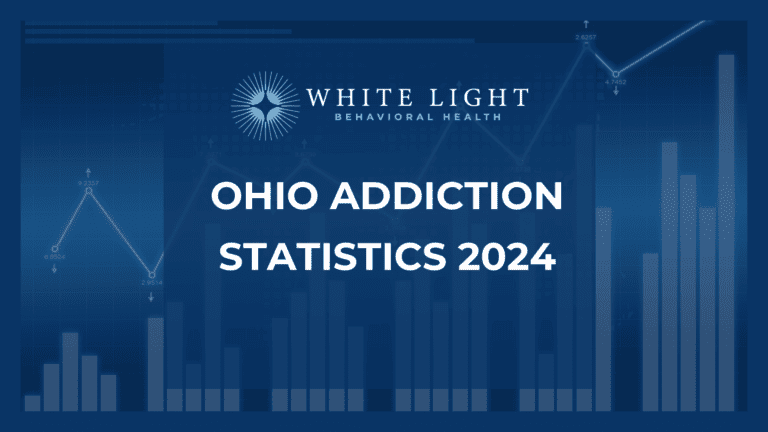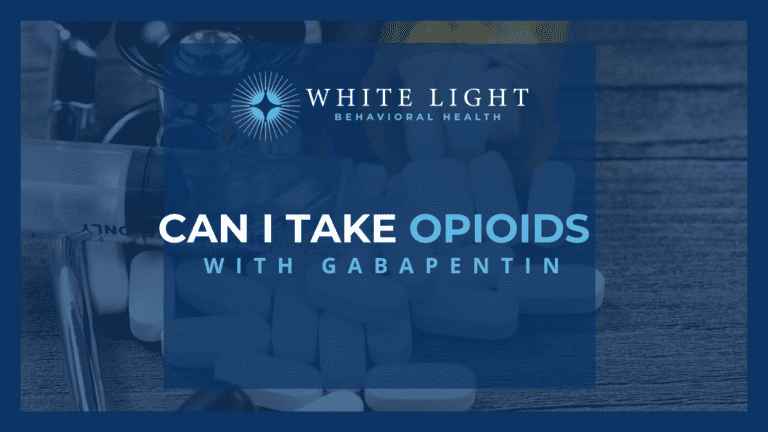
Prescription drug addictions are a prevalent issue in today’s world, and Xanax (alprazolam) dependency is one of the most common examples. Although the drug has legitimate medical uses, it’s also addictive and has a high potential for abuse. If you or someone you care about has taken Xanax for a prolonged time, it may prove very challenging to decrease the usage or stop taking it. For those who take it regularly, there can be significant physical and psychological withdrawal symptoms that start to appear after it leaves the system. There may also be underlying behavioral issues that make it extremely difficult to avoid taking the medication.
If you or someone you know is looking to overcome a Xanax addiction, it’s worth reaching out to a quality detox clinic. At White Light Behavioral Health, located in Columbus, Ohio, we help clients get started on the road to recovery by providing them with the support and resources they need to beat their addictions.
What Is Xanax?
Xanax is the most common brand name of the drug alprazolam, a benzodiazepine meant to treat anxiety and panic disorders. Benzodiazepines work by acting on the brain and nerves to produce a calming effect, which they achieve by enhancing the effects of a natural chemical in the body called GABA. The medication comes in the form of a tablet to be taken orally, and the effects typically kick in within one to two hours. Xanax is prescribed in strengths of 0.25, 0.5, 1, and 2 mg, with the pills coming in different shapes and colors depending on the dosage.
- Although Xanax does help numerous people, it also comes with a significant risk of addiction as well as overdose. These risks are quite a bit higher for people with substance use disorders, such as addictions to alcohol or other drugs.
Who Needs Xanax Addiction Treatment?

Xanax is a very addictive drug, and for anyone who’s been taking it regularly for a prolonged period, quitting can be challenging. For one thing, symptoms of withdrawal from Xanax are typically more powerful than the withdrawal symptoms of other benzodiazepines. Because of the drug’s potency, it can also be difficult to overcome psychological cravings and dependency. To successfully overcome a Xanax addiction, it’s necessary to go through a benzodiazepine detox process and also address the behavioral issues associated with drug use.
Individuals Who Could Benefit from Xanax Addiction Rehab at White Light Behavioral Health:
- You’re in active addiction and struggling to stop using: If you find yourself unable to quit Xanax despite your best efforts and are caught in the cycle of addiction, our rehab program can provide the structured support you need.
- You use Xanax to manage mental health disorders: Whether you’re using Xanax to feel “normal” due to anxiety, depression, or another mental health condition, rather than for recreational purposes, our dual diagnosis treatment can address both your substance use and mental health needs.
- You’re in active addiction and struggling to stop using: If you find yourself unable to quit Xanax despite your best efforts and are caught in the cycle of addiction, our rehab program can provide the structured support you need.
- You use Xanax to manage mental health disorders: Whether you’re using Xanax to feel “normal” due to anxiety, depression, or another mental health condition, rather than for recreational purposes, our dual diagnosis treatment can address both your substance use and mental health needs.
- You feel stuck without a clear path to recovery: If the idea of living without Xanax seems impossible and you can’t envision a future free from dependency, our program can help illuminate the way forward with comprehensive care and support.
- You’re facing challenges in maintaining your daily responsibilities: If your Xanax use is interfering with your ability to fulfill the roles and responsibilities in your personal, professional, or academic life, our rehab services can help you rebuild your capacity to function without reliance on substances.
- You have a mental health disorder, diagnosed or undiagnosed: For those who are battling with mental health issues alongside Xanax addiction, whether diagnosed or not, our rehab program offers specialized care that addresses both aspects simultaneously, promoting holistic healing and recovery.
Xanax is a very addictive drug, and for anyone who’s been taking it regularly for a prolonged period, quitting can be challenging. For one thing, symptoms of withdrawal from Xanax are typically more powerful than the withdrawal symptoms of other benzodiazepines. Because of the drug’s potency, it can also be difficult to overcome psychological cravings and dependency. To successfully overcome a Xanax addiction, it’s necessary to go through a benzodiazepine detox process and also address the behavioral issues associated with drug use.
Individuals Who Could Benefit from Xanax Addiction Rehab at White Light Behavioral Health:

Xanax Rehab Programs at White Light Behavioral Health In Columbus, Ohio
- At White Light Behavioral Health, nestled in the heart of Columbus, Ohio, we specialize in providing comprehensive care for individuals battling Xanax addiction. Our tailored approach to detox and rehabilitation is designed to meet the unique needs of each client, ensuring a pathway to recovery that is both effective and sustainable. With a focus on holistic healing, our programs are structured to address the physical, emotional, and psychological facets of addiction.
- Our Xanax Recovery Programs include:
- Residential Treatment Program: Our intensive residential program offers a structured environment where clients can fully immerse themselves in the recovery process. With 24/7 care and support, individuals receive medical detoxification to safely manage withdrawal symptoms, alongside ongoing therapy to address the root causes of addiction.
- Partial Hospitalization Program (PHP): As clients progress in their recovery, our PHP provides a critical bridge between inpatient treatment and independent living. This day program offers the benefits of a structured treatment environment during the day, while allowing clients the flexibility to return home or to a sober living environment in the evenings.
- Intensive Outpatient Program (IOP): Designed for those who need continued support but with greater flexibility, our IOP facilitates further stabilization and independence. Clients participate in therapy sessions and workshops that fit around their personal and professional commitments, ensuring continued progress toward recovery.
- Outpatient Program (OP): Tailored for clients transitioning back to their daily lives, our OP focuses on relapse prevention and ongoing support. Through regular therapy sessions and access to community resources, clients maintain their sobriety while navigating the challenges of everyday life.

Understanding Xanax Withdrawal
Locating White Light Behavioral Health
White Light Behavioral Health is conveniently located in Ohio, making it accessible to individuals seeking help with Xanax withdrawal. Our facility is designed to be a peaceful retreat where clients can concentrate on their recovery in a calm and supportive setting.
Take the First Step Toward Recovery
Beginning the journey to recovery from Xanax addiction marks a critical step towards regaining control over one’s life. At White Light Behavioral Health, we are prepared to guide you through the medical detox process and support your transition into a life of sobriety and health. If you or someone you care about is struggling with Xanax dependence, we encourage you to reach out to us. Discover more about our White Light Behavioral Health and how we can help you or your loved one set out on the path to recovery and healing.
At White Light Behavioral Health, our commitment to providing comprehensive, compassionate care for individuals dealing with Xanax addiction is unwavering. Our team is here to support you every step of the way as you work towards a brighter, substance-free future.
Frequently Asked Questions About Xanax Addiction Treatment At White Light
Can I continue working while enrolled in the Xanax Program at White Light?
Yes, we offer flexible treatment options, including outpatient programs, to accommodate your work schedule. Our goal is to support your recovery journey while allowing you to maintain your professional commitments, ensuring a balance between treatment and daily life.
Is it possible to smoke cigarettes while undergoing treatment in the Xanax Program?
Yes, White Light Behavioral Health understands the challenges of quitting multiple habits simultaneously. We provide designated smoking areas for clients in our program. However, we also offer resources and support for those looking to quit smoking as part of their overall wellness plan.
How does White Light address the mental health aspects of Xanax addiction?
Recognizing the strong link between substance use and mental health, our Xanax Program includes dual diagnosis treatment. This means we not only treat the addiction but also address underlying mental health conditions through therapy, counseling, and, if necessary, medication management.
Is it safe to detox from Xanax at home?
Detoxing from Xanax at home without medical supervision is not recommended due to the potential for severe withdrawal symptoms, including seizures. Medical supervision ensures safety and comfort during the detox process.
Can I just stop taking Xanax or do I need to taper off?
Abruptly stopping Xanax can lead to severe withdrawal symptoms. A medically supervised tapering schedule is often recommended to gradually reduce the dosage and minimize withdrawal symptoms.
How can I prepare for Xanax detox?
Preparing for detox includes consulting with a healthcare provider to develop a detox plan, arranging for time off work or responsibilities, and ensuring a supportive environment at home or selecting a detox facility.
What happens after Xanax detox?
After detox, ongoing treatment for recovery may include therapy, support groups, and possibly medications to manage any underlying conditions like anxiety or depression.
Will my anxiety return after stopping Xanax?
Anxiety can return after stopping Xanax, especially if it was used to manage anxiety symptoms. However, alternative treatments and therapies can effectively manage anxiety without the risk of dependence.



